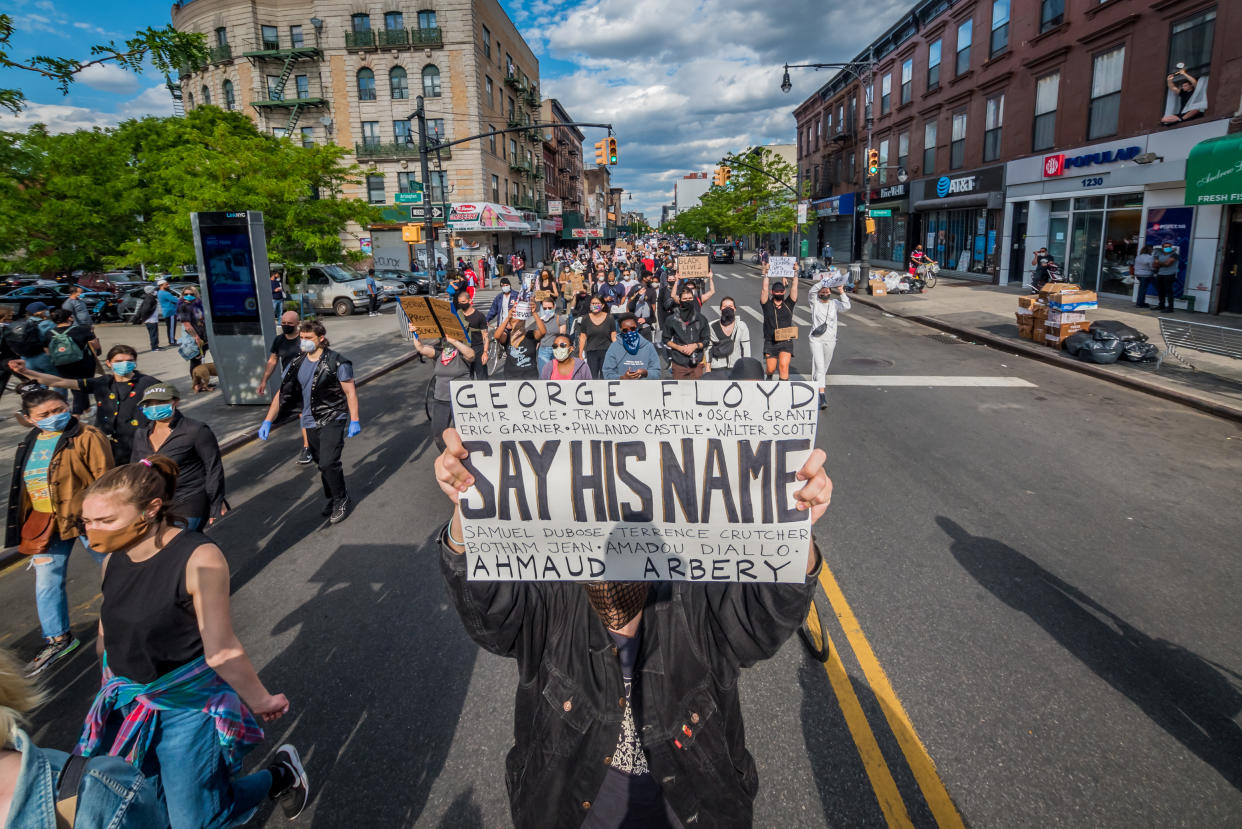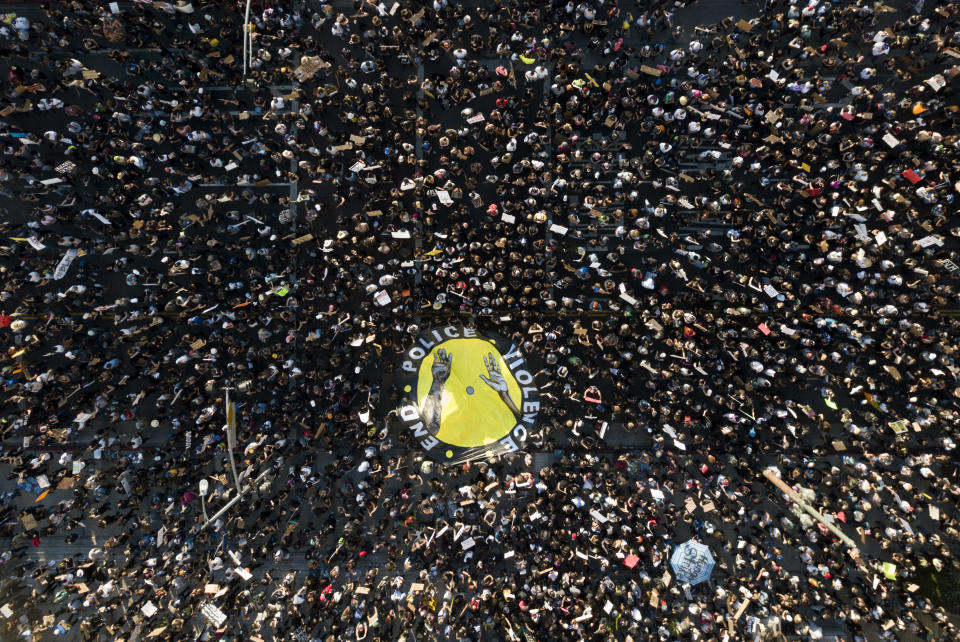#SayHerName: Tepid response to Breonna Taylor's killing has many wondering which black lives matter?

The George Floyd protests have quickly gained massive support, going from a statewide to a national to a global movement in just a matter of days. But as all 50 states have now participated in what is being called a revolution in some corners, many black women have been left wondering when their equally tragic deaths, at the hands of police, will spark the same level of outrage.
Floyd, Ahmaud Arbery, Freddie Gray, Trayvon Martin, Michael Brown and Eric Garner have all become household names and viral hashtags. But what about Pamela Turner, Sherida Davis or Domonique Clayton? These unarmed black women died at the hands of police officers, but their deaths received neither the same media attention nor widespread public fury as seen, most recently, in the current Floyd demonstrations.
The lack of palpable concern for black women hasn’t gone unnoticed on social media, with many speaking out — some invoking the Say Her Name hashtag, coined in 2015 as part of a study by the African American Policy Forum following the death of Sandra Bland — in an effort to bring attention to these seemingly forgotten victims of police brutality.
The officers who murdered Breonna Taylor nearly three months ago still have not been charged. We can’t forget about Black women in our quest for justice.
— Kamala Harris (@KamalaHarris) June 4, 2020
“It's true that when black women die at the hands of police, those stories are rarely told, and almost never galvanize mass protests,” Judy Lubin, sociologist, policy analyst, Howard University adjunct sociology professor and principal of the Center for Urban and Racial Equity tells Yahoo Life. “The experiences of black women with police brutality is lost in the national conversation, except as grieving partners or mothers of boys and men.”
While black men are indeed at a higher risk of dying at the hands of police, Lubin says, “Black women are increasingly being stopped by police and experience physical assault, sexual violence and death at rates that belie media coverage of these issues.” Ironically enough, a 2018 study shows “the odds that black Americans will be killed by police when unarmed are nearly 7 to 1 and due primarily to the unarmed status of black women.” It further explains that nearly 60 percent of black women killed by police were unarmed during the incident.

"I think this story is really important to be told, especially with what's going on around the country right now, because for so long black girls were really left out of the conversation about justice — really left out of conversations about how we imagine and reframe our conversations around equity, even as they were a part of constructing that for the nation,” social-justice scholar and author Monique W. Morris told Yahoo Life recently while discussing her new documentary, Pushout: The Criminalization of Black Girls in Schools.
She continued, “Our protests are often in the name of men and boys, and we forget that so many girls, young women, transwomen and girls are disproportionately impacted by the same state-sanctioned violence that our men and boys are experiencing." While it’s important for society to respond to the violence affecting black men and boys, she added, “we also can't do that to the exclusion of black women and girls.”
As Lubin notes, “Police violence against black people is a collective experience, and we have to be intentional about lifting up the stories and experiences of women, men, queer and trans members in our communities.”
A quick reminder the cops who killed #BreonnaTaylor are still on the job just like the one who killed #PamelaTurner last year. Black women have fought against police brutality and anti-black vigilantism for over a century. Who will fight for us? pic.twitter.com/AqOYRZunca
— Torchy Windrush Brown🇯🇲🇬🇧🇬🇩🇺🇸 (@MinoWarrior) June 2, 2020
So then why such a stark difference in public response? Some experts say it is partially due to how these tragedies are unearthed. Lubin believes the advancements of social media and widespread sharing of videos plays an important yet often overlooked role.
“The dominant narrative that police brutality victims are black men may not prompt people to record black women’s interactions with police, which has been a large part of why black men’s deaths have gone viral in recent years. Many of them have been captured on video,” she explains. “So that’s one part of the issue. It may also be the case that black women are dying out of public view, and that adds to our invisibility.”
Take the case of Breonna Taylor, she says, whose death occurred at night, in her home and was not recorded. “Same with Atatiana Jefferson,” she says. “Although these two cases received more attention than other cases of black women killed by police, they did not spark mass protests or wall-to-wall media coverage. So, to some extent, the deaths of black women are not taken as seriously and are not associated with the broader problem with policing in the ways that black men’s deaths have been tied to a systemic pattern of excessive use of force that needs to be challenged.”
Why is police brutality and violence towards black women and black trans men and women often overlooked? They deserve the same amount of justice as anyone else. You cannot say you support the Black Lives Matter movement but have limitations as to which black life matters.
— Madison 🇳🇬 (@WastelandMads) June 3, 2020
Additionally, Lubin tells Yahoo Life that the erasure of black women from the collective struggle is something that’s been happening for quite some time. “There is a history of invisibility when it comes to black women as victims of violence. Stories of missing black women, of black women who are raped, barely make the headlines, as well. We see an interplay of gender, race and class that often relegates black women as less sympathetic — and responsible for the harm imposed on us.”
Black women are pleading for us not to forget Breonna Taylor.
Let’s continue to lift her story along with Nina Pop, Atatiana Jefferson, Sandra Bland, Korryn Gaines, Rekia Boyd and so many other Black women who have lost their lives at the hands of police— Wes (@wgobar) June 2, 2020
Please, do not forget about Breonna Taylor. I’m seeing a lot of posts and convos exclude her. We need to be talking about Breonna Taylor as well as George Floyd. Black women been on that front line more than anyone else. Stand up for them, please.
— Sporty Spice (@CoopLeModerne) June 1, 2020
In a recent Medium op-ed, “Where is the outrage for Breonna Taylor?” Renee Nishawn Scott writes, “Until we as a society are outraged about the murder of all Black people — which includes women and trans people, we are no closer to building a just future than we are by doing nothing at all.”
Read more from Yahoo Life:
